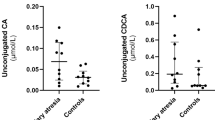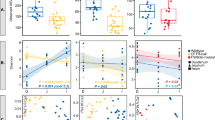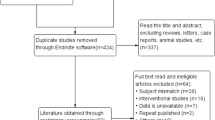Abstract
ABSTRACT: The cause(s) of excessive fecal bile acid loss in cystic fibrosis (CF) has not yet been fully determined, but in vitro studies have suggested that a primary mucosal defect in ileal bile acid uptake may be of importance. To examine this mechanism in vivo, the terminal ileal uptakes of taurocholate and glycocholate were determined using a marker-perfusion technique in three CF infants and four controls. Normal and CF ileal conditions were simulated by varying the taurocholate:glycocholate concentration ratio (normal 1:1, CF 1:4) and pH (normal 7.8, CF 6.0) of the perfusate. The mean bile acid uptake under normal perfusate conditions was not significantly different in CF subjects (taurocholate 0.124 μmol/min/cm ileum ± SD 0.127, glycocholate 0.117 μmol/min/cm ileum ± 0.114), and controls (0.142 ± 0.164 and 0.115 ± 0.120 respectively). Similarly, under CF conditions, bile acid uptake values in CF subjects and controls were similar. The results are not consistent with deranged ileal bile acid reabsorption being a major cause of fecal bile acid loss in CF.
Similar content being viewed by others
Log in or create a free account to read this content
Gain free access to this article, as well as selected content from this journal and more on nature.com
or
Author information
Authors and Affiliations
Rights and permissions
About this article
Cite this article
Thompson, G., Davidson, G. In Vivo Bile Acid Uptake from Terminal Ileum in Cystic Fibrosis. Pediatr Res 23, 323–328 (1988). https://doi.org/10.1203/00006450-198803000-00018
Received:
Accepted:
Issue date:
DOI: https://doi.org/10.1203/00006450-198803000-00018
This article is cited by
-
Infants with cystic fibrosis have altered fecal functional capacities with potential clinical and metabolic consequences
BMC Microbiology (2021)
-
Ileal mucosal bile acid absorption is increased in Cftr knockout mice
BMC Gastroenterology (2001)
-
Cystic fibrosis, pathophysiological and clinical aspects
European Journal of Pediatrics (1990)



